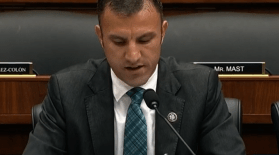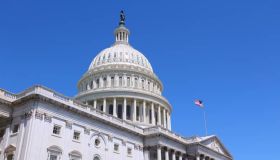
Source: Photo: Eric Berman/WIBC)
STATEHOUSE — Disagreement is common among lawmakers at the Indiana Statehouse, however this time around it is among Republican lawmakers between both chambers.
This being a budget year, lawmakers are in charge of coming to an agreement on how to spend your tax money over the next two years. So far Republicans in both chambers have agreed on budget proposals. But, that came to end this week when State Senators rolled out their budget proposal which did not match a plan from House Republicans on the state’s school voucher program.
House lawmakers approved a budget last month that would expand the voucher program to allow more parents to send their kids to private schools, a move that has gotten sharp criticism from many educators around the state.
“We are calling on (lawmakers) to fully fund public schools where 90 percent of all students in Indiana go to school,” exclaimed Keith Gamble, the Indiana State Teacher Association President in a rally at the Statehouse Thursday.
“They want to siphon money away from our schools to private schools,” he added. “They want to prevent students from being safe and fully themselves!”
Senators, on the other hand, want a different approach. Instead of expanding vouchers, they want to roll out a plan that would allow private schools where students want to go to dip into the property taxes of the public school district where that student may live.
That idea received just as much criticism as the plan in the House version.
“There are some corporations, even rural school corporations, that have low collection rates and low assessed value,” said State Sen. Eddie Melton (D). “Having to share that with other entities, I think, would be a disproportionate share.”
State Sen. Ryan Mishler (R) disagrees.
“Some of the charter schools (for example) are not going to get much property tax revenue because of what they said about the low assessed value,” he said. “So it would be the same thing. They wouldn’t be getting much property tax money if there is no assessed value.”
Then there is the subject of the 988 suicide and crisis hotline. Both Republicans and Democrats in both chambers agree that it needs to be bolstered and expanded in Indiana. Where everyone differs, again, is how to pay for that expansion.
The House budget would enact an increase in cigarette taxes to fund 988, but the Senate budget would enact a cell phone tax. Mishler acknowledges that once they pass their version in the Senate some long talks will be had with House lawmakers to reconcile their differences.
“We agree that we didn’t fully fund (988),” said Mishler. “Just general fund dollars, but we gotta put something else in there. But, we gotta decide what that’s going to be. What we decided to do is what is that fee going to be.”
The session is due to adjourn for the year on April 29th, giving lawmakers only a couple of weeks to work out their differences.
















